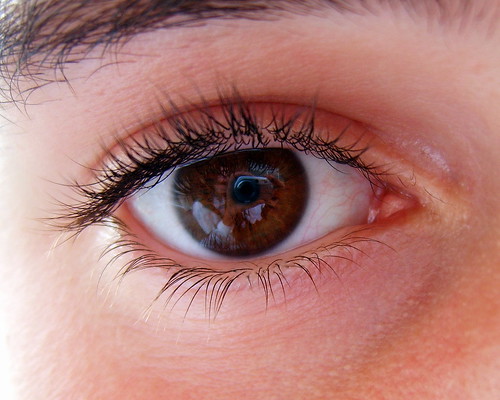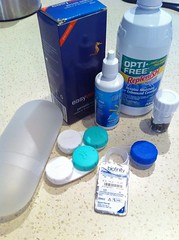
Contact lenses are worn by nearly 40 million Americans, so it's safe to assume they're not dangerous. But they do require a certain amount of responsibility, because if you don't care for your lenses or adhere to the right rules when it comes to wearing them, you could cause damage to your eyes.
Most people understand the basics of contact lenses - you must keep them clean and disinfected and replace them on schedule. But not everyone really understands what the risks are for improper use. Here are a few hard and fast guidelines for protecting your eyes long after you've ditched your glasses.

1. Cleaning Your Lenses
With daily wear contact lenses, which are the most common, it's important to wash your hands before you even handle your lens case. Antimicrobial soaps have been proven to be the most effective at preventing infection.However, you should make sure you rinse the soap off completely and stay away from lotions - these will obviously burn and sting your eyes! Completely drying your hands is important, too, because tap water can also introduce bacteria.
Taking some time out to ensure you are cleaning your lenses as thoroughly as possible will keep them clear, less flimsy, and free of abrasions throughout their appropriate usage time. It's the quickest way to stay safe and save money.
If you want to avoid the hassle of cleaning, you can invest in daily disposable lenses, which are discarded every night and have been proven to cause the least amount of infection.
2. When to Take Them Out
Sometimes contact lens wearers are confused about what kind of situations are appropriate for wearing lenses. You should never sleep in your lenses unless you have extended wear contacts.According to the American Optometric Association, sleeping in contacts not intended for overnight use can raise your rate of corneal infection up to 5 times the normal level. The only appropriate nighttime contacts are extended wear, where you can keep them in for up to 30 days, and new nightly contacts, which can lower the rate of presbyopia in patients over age 40.
It's also unwise to wear lenses in the shower or during swimming or other activities that put you in contact with the water. Just like with washing your hands, water can introduce bacteria to your eyes, especially chlorine-treated pool water.
You can solve your swimming problems with a pair of goggles, or do your best to keep your eyes closed or clear of the water if you are showering in your lenses.

3. Other Important Information
It's crucial to dispose of your lenses at the appropriate time, whether that's daily, weekly, monthly, or simply when your doctor recommends. Over half of contacts wearers stretch the correct schedule and only dispose of their lenses once they start to bother them.This is dangerous, because by the time your lenses are actually bothering you, several problems may have already arisen. Serious inflammation or infection could require medication and keep you from wearing contacts for months.
While rewetting drops are useful for irritation, always use your proper contact solution for cleaning because other solution won't be effective. And never reuse solution - always wipe your case down and refill with new liquid for storing your lenses.
Cases should be replaced every one to three months and stored in an environment as free from humidity as possible.
Final Note
Never hesitate to make an appointment with your eye doctor for any irregularities in your contact lenses. Whether it's discomfort, blurriness, or watery eyes, it could be a sign of a bigger problem, and you shouldn't be wearing scratched or defective lenses any longer than you have to.
Contact lenses are a very safe way to protect your eyes when you use them correctly, but the safety guidelines for that use should never be forgotten. Take your sight seriously, and it will never be a hassle.
Marilyn Baur loves wearing contacts instead of glasses and suggests checking out seeside lenses for affordable contact lenses and a great selection.
Remove contact lenses before swimming or entering a hot tub.
ReplyDeleteNever use tap water to clean, store or soak your lenses, ever.
ReplyDeleteDon’t buy large bottles of solutions if you wear lenses infrequently- the solutions may go past their use by date- try to get smaller bottles, or consider disposable lenses.
ReplyDeleteDo get your eyes and lenses checked regularly
ReplyDeleteIt is important to know the schedule your contacts are intended for to prevent problems with your eyes.
ReplyDeleteNever go to bed with a painful red eye. Seek advice immediately.
ReplyDeleteNever bring your lenses into contact with tap water.
Never wet your lenses with saliva.